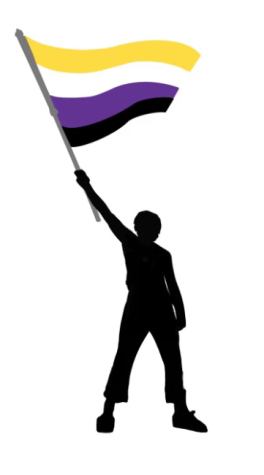The Impact of Representation
May 27, 2022
In recent years, more and more controversy has arisen over the inclusion of LGBTQ+ people in the media. From controversy over LGBTQ+ dancer Jojo Siwa appearing on Nickelodeon, to debates in Florida over state law’s stance towards LGBTQ+ education, representation has faced increasing scrutiny. As a community that often lacks awareness and understanding from the general public, non-binary people are particularly impacted by battles over-representation.

In 2016, an Indiana woman’s story about the impact of representation went viral and garnered media attention. As a worker at a comic book store, she encountered a young LGBTQ+ woman who was looking for a copy of Supergirl. Breaking down in tears, the young woman explained that seeing the televised version of the comic had saved her life; after attempting suicide and experiencing severe mental health crises, she found new hope in the stories of LGBTQ+ people finding happiness that she saw on TV.
“Representation matters more than ever as people turn to entertainment storytelling for connection and escape,” Sarah Kate Ellis, the president of the LGBTQ+ advocacy group GLAAD, said in 2021. With the COVID-19 pandemic and other societal trends increasing the influence of technology, she explained, so too is the importance of media representation increasing.
Various forms of representation for non-binary people, and for LGBTQ+ people more broadly, have recently faced attacks. In 2021, according to the American Library Association, the book “Gender Queer” by Maia Kobabe was the most challenged book of the year. That means that across the country, teachers and librarians faced claims that the book was not appropriate for people to access and thus should be banned. The book specifically addresses Kobabe’s experiences with non-binary gender, as Kobabe uses the pronouns e/em/eir and does not identify as male or female. It has been removed from libraries across the country on the basis that its illustrations, which include depictions of LGBTQ+ people that some consider explicit, are inappropriate.
“There are people for whom this is vital and for whom this could maybe even be lifesaving,” Kobabe said of their book.
Many other LGBTQ+ books, including those like Kobabe’s that address non-binary gender, have faced challenges and bannings in recent years. Additionally, the inclusion of LGBTQ+ people in television, cinema, and other forms of media has repeatedly stirred controversy.
For non-binary people, the fight to include their voices and experiences in popular culture and media is an ongoing struggle. This, among other issues, can contribute to non-binary people feeling unwelcome. However, there are some hopeful developments. For example, popular music artists Sam Smith and Demi Lovato have come out as non-binary and used their platforms to advocate for equality. Seeing them living openly in the world may help create some of the positive impacts of representation that can otherwise be challenging for non-binary people to find.